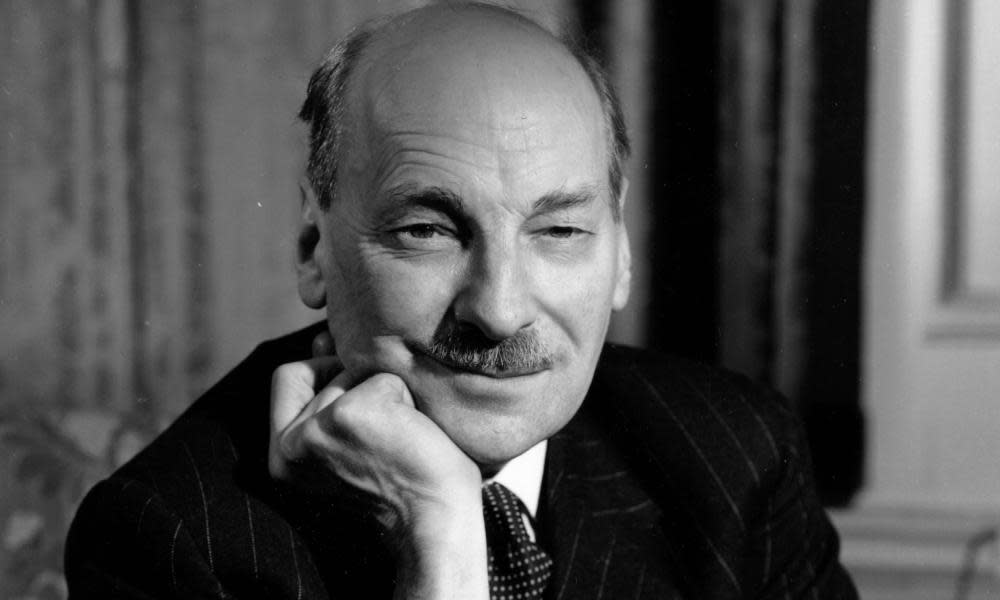If postwar history starts in 1951, did the Tories ‘blue-wash’ the A-level syllabus?

It’s 3.15pm on a Wednesday afternoon in the airy atrium of the Suffolk One sixth-form college in Ipswich, and there’s a palpable sense of relief. This year’s A-level history candidates have emerged from an exam on Churchill, and are chatting animatedly about it with their teacher, Jenny Moore.
They are delighted because they were asked to discuss an extract on Churchill from the war diaries of General Sir Alan Brooke, which they know well. They have loved this part of the Oxford, Cambridge and RSA (OCR) exam board’s history syllabus.
“My granddad is 80 and he’s read every biography of Churchill. He was surprised at the range of stuff we were studying,” says Joshua Williams, 18.
Churchill might seem obvious fodder for students – he was once voted the greatest Briton of all time in a BBC poll – but not everyone would agree. A Labour MP, Rupa Huq, has been asking questions about this module, in which students look at Churchill from 1930-51 and Britain from 1951-97. Why, she wants to know, is 15% of the A-level mark allocated to Churchill? Why does the second part of the module start in 1951, at the end of a Labour administration, and end in 1997, at the beginning of one?
Has the study of British history been “blue-washed” by the Conservatives? Can the hand of the former education secretary Michael Gove – whose revised A-level curriculum was examined for the first time last year – be seen here?
Huq, the MP for Ealing Central and Acton, raised concerns after chatting to a student at her former private girls’ school in west London. “1945 to 1951 was a significant time for our nation: the birth of the NHS, the postwar welfare settlement – it seems to me like ‘Gove-isation’,|” she says. “And seeing everything through the lens of Churchill – it’s a hagiography of one person.”
There are some history teachers who agree with her. Rob Gallimore, a former Welsh Guards officer who teaches at the independent Taunton school in Somerset, wrote to Huq and subsequently accompanied her to a meeting with OCR and the House of Commons’ education committee chair, Robert Halfon.
Gallimore says: “It’s full of subliminal, subconscious bias. I don’t think OCR has sat in some sort of Davos-style retreat and decided to airbrush Clement Attlee from history, but little things add up to create an odd-looking syllabus.”
While the exam board has flatly denied any bias, it has taken the criticism seriously –it will ask its subject forum to look at the issue. Its history specialist, Mike Goddard, admits it might appear slightly surprising to study postwar British history from 1951, but says that students do need to understand the context: “There isn’t an expectation for teachers to characterise this period in one way or another; they’re just teaching the political events of the period.”
‘Seeing everything through the lens of Churchill – it’s a hagiography of one person. It seems to me like Gove-isation’
MP Rupa Huq
There has been no attempt to put Churchill on a pedestal, insists Goddard. “This is absolutely not a hagiography. Actually, there is a great deal of myth-busting in it.”
While some teachers supported Huq’s view, others see it differently. Jonathan Wilbraham, the deputy head of sixth form at Durham Johnston comprehensive school, says OCR should probably have framed some aspects of the course differently. “I don’t think it’s encouraging a ‘blue-wash’,” he says. “But in my view, there’s been some clumsy branding by the exam board – maybe they should have called that part Churchill and Attlee.”
Back at Suffolk One, both students and teacher reject the notion that there is bias in the course. Moore, the group’s teacher, says her students need to know about Attlee to understand the 1951 election: “Rupa Huq talks about the fact that students are asked about ‘Labour weaknesses and Conservative strengths’, but that’s a technique to explore the 1951 election. The main Conservative strength is their adoption of Labour policies. My point would be: it’s in there. The course has to start and end somewhere.”
Joshua Williams agrees: “The course showed Churchill’s ability to lead, but also why people didn’t want him to be in power and why he had so many opponents. We study all that, not even to come up with an opinion –we’re just trying to get the balance in.”

 Yahoo News
Yahoo News 
